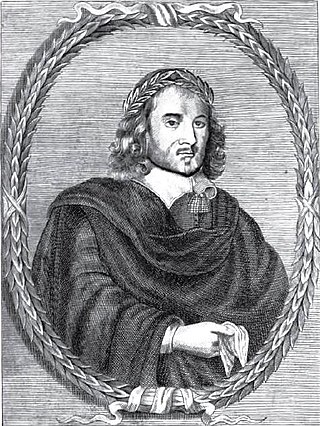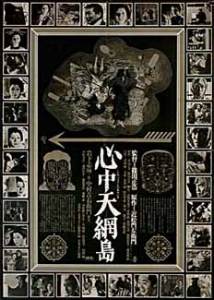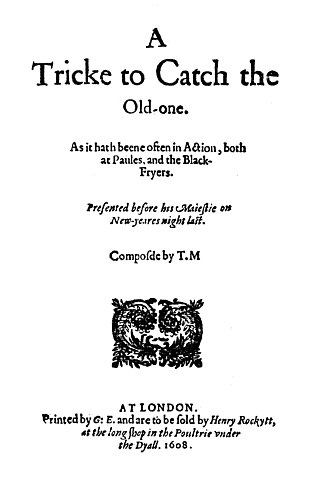Related Research Articles

Thomas Middleton was an English Jacobean playwright and poet. He, with John Fletcher and Ben Jonson, was among the most successful and prolific of playwrights at work in the Jacobean period, and among the few to gain equal success in comedy and tragedy. He was also a prolific writer of masques and pageants.
Menaechmi, a Latin-language play, is often considered Plautus' greatest play. The title is sometimes translated as The Brothers Menaechmus or The Two Menaechmuses.
Pseudolus is a play by the ancient Roman playwright Titus Maccius Plautus. It is one of the earliest examples of Roman literature. Pseudolus was first shown in 191 B.C. during the Megalesian Festival, which was a celebration for the Greek Goddess Cybele. The temple for worship of Cybele in Rome was completed during the same year in time for the festival.

The Honest Whore is an early Jacobean city comedy, written in two parts; Part 1 is a collaboration between Thomas Dekker and Thomas Middleton, while Part 2 is the work of Dekker alone. The plays were acted by the Admiral's Men.

Double Suicide is a 1969 Japanese historical drama film directed by Masahiro Shinoda. It is based on the 1721 bunraku play The Love Suicides at Amijima by Monzaemon Chikamatsu.

Dennis Leroy Hof was an American brothel owner. He owned seven legal brothels in Nevada, most notably the Moonlite BunnyRanch. Hof was also a Republican candidate in 2018 for the Nevada Assembly, to which he was posthumously elected less than one month after his death.

The Roaring Girl is a Jacobean stage play, a comedy written by Thomas Middleton and Thomas Dekker c. 1607–1610.
Anything for a Quiet Life is a Jacobean stage play, a city comedy written by Thomas Middleton and John Webster. Topical allusions suggest the play was written most likely in 1621.

Procuring, pimping, or pandering is the facilitation or provision of a prostitute or other sex worker in the arrangement of a sex act with a customer. A procurer, colloquially called a pimp or a madam or a brothel keeper, is an agent for prostitutes who collects part of their earnings. The procurer may receive this money in return for advertising services, physical protection, or for providing and possibly monopolizing a location where the prostitute may solicit clients. Like prostitution, the legality of certain actions of a madam or a pimp vary from one region to the next.
No Wit, No Help Like a Woman's is a Jacobean tragicomic play by Thomas Middleton.

MichaelmasTerm is a Jacobean comedy by Thomas Middleton. It was first performed in 1604 by the Children of Paul's, and was entered into the Stationers' Register on 15 May 1607, and published in quarto later that year by Arthur Johnson. A second quarto was printed in 1630 by the bookseller Richard Meighen.
A Mad World, My Masters is a Jacobean stage play written by Thomas Middleton, a comedy first performed around 1605 and first published in 1608. The title had been used by a pamphleteer, Nicholas Breton, in 1603, and was later the origin for the title of Stanley Kramer's 1963 film, It's a Mad, Mad, Mad, Mad World.

A Trick to Catch the Old One is a Jacobean comedy written by Thomas Middleton, first published in 1608. The play is a satire in the subgenre of city comedy.
The Family of Love is an early Jacobean stage play, first published in 1608. The play is a satire on the Familia Caritatis or "Family of Love," the religious sect founded by Henry Nicholis in the 16th century.
The Woman Hater, or, The Hungry Courtier is an early Jacobean era stage play, a comedy by Francis Beaumont and John Fletcher. One of the earliest of their collaborations, it was the first of their plays to appear in print, in 1607.
The World Tossed at Tennis is a Jacobean era masque composed by Thomas Middleton and William Rowley, first published in 1620. It was likely acted on 4 March 1620 at Denmark House.
Melancholia is a 2008 Philippine black and white slow drama film shot, edited, composed, written, produced and directed by Lav Diaz. It won the Horizons prize at the 65th Venice International Film Festival.

Natasha Falle is a Canadian professor at Humber College in Toronto, Ontario, Canada, who was forcibly prostituted from the ages of 15 to 27 and now opposes prostitution in Canada. Falle grew up in a middle-class home and, when her parents divorced, her new single-parent home became unsafe, and Falle ran away from home. At the age of 15, Falle became involved in the sex industry in Calgary, Alberta.
Bridget Perrier is an activist and former trafficked prostitute who cofounded Sex Trade 101 with Natasha Falle. She became a child prostitute at the age of 12 while she was staying at a group home and an older girl there persuaded her to become a runaway in order to sell sex to a pedophile named Charlie. She had a son, Tanner, who developed cancer as an infant and died at the age of five with the dying wish that his mother get out of the sex industry. In 2000, she moved to Toronto from Thunder Bay, Ontario, Canada. She is the stepmother of Angel, whose biological mother was Brenda Wolfe, one of Robert Pickton's murder victims. In 2009, Perrier accompanied Angel at Toronto's Native Women's Resource Centre for the Sisters in Spirit vigil in remembrance of Wolfe and the other more than 500 Canadian Aboriginal women who have been murdered or gone missing over the past 30 years. In 2010, Perrier picketed a courthouse in downtown Toronto in recognition of International Day of No Prostitution. She was joined by Trisha Baptie, Natasha Falle, Katarina MacLeod, and Christine Barkhouse, all former human trafficking victims. In 2012, after being removed from a news conference relating to Bedford v. Canada, Perrier demonstrated a pimp stick to the media, saying that she had been battered with a pimp stick by her pimp every day that he prostituted her. Perrier opposed the legalization of brothels as proposed in Bedford v. Canada, saying, "Having a legal bawdy house is not going to make it any safer. You are still going to attract serial killers, rapists, perverts." Bridget shared her story in the ground breaking article by Dr. Vincent J. Felitti in Cancer InCytes magazine about how childhood trauma is associated with chronic diseases during adulthood and how child trafficking will eventually worsen the economic burden on civil governance.

Goldstone is a 2016 Australian crime thriller film directed by Ivan Sen. It is a sequel to Mystery Road (2013) and stars Aaron Pedersen, Alex Russell, Jacki Weaver, David Wenham and David Gulpilil. It was released in Australia on 7 July 2016. According to the film's end credits, it was largely shot on location in the small town of Middleton, Queensland, Australia.
References
- ↑ E. K. Chambers, The Elizabethan Stage, 4 Volumes, Oxford, Clarendon Press, 1923; Vol. 3, p. 440.
- ↑ Swapan Chakravorty, Society and Politics in the Plays of Thomas Middleton, Oxford, Oxford University Press, 1996; pp. 61–2.